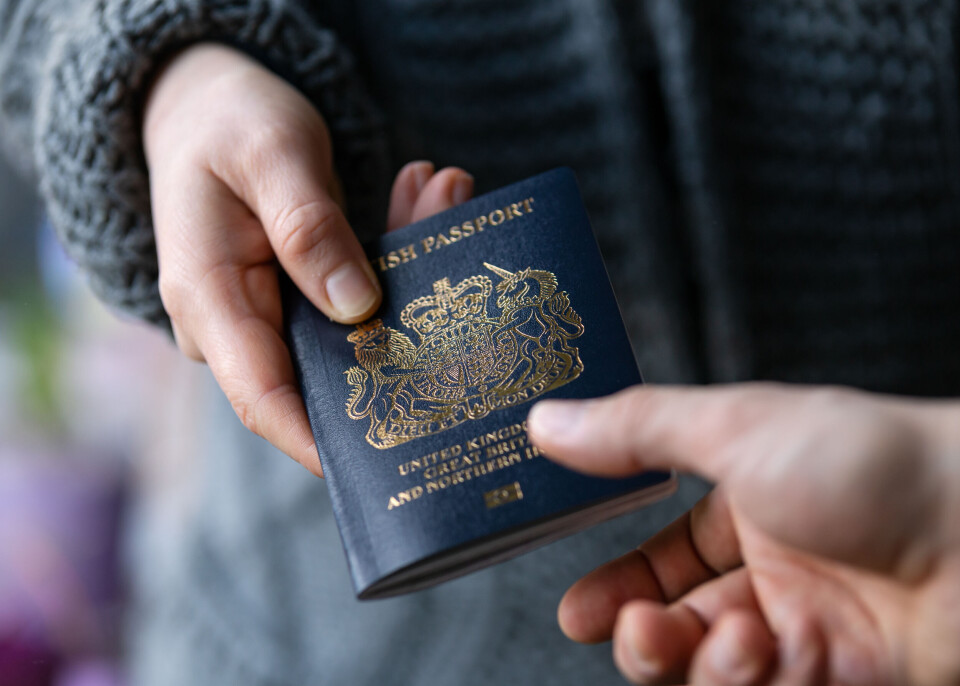-
New rules aim to stop ‘spoofing’ calls in France: what are these?
Calls from French numbers abroad will need to be verified or show as ‘hidden number’, with residents urged to be vigilant about answering
-
Ryanair confirms routes to Dole-Jura airport maintained in summer 2026
Airline previously said that more routes to France will be axed next year
-
Explosion at chemical plant near Lyon: where are other ‘at risk’ sites in France?
An estimated 2.5 million people live within a kilometre of a French Seveso site
Explainer: France’s Brexit residency cards and foreign travel
We look at issues that can arise when travelling with Brexit residency cards, including passport stamps, e-gates and the new Etias / EES systems

Travelling with a WA (Withdrawal Agreement) Brexit residency card can bring some minor issues or complexities, such as which queue to go in at airports or whether your passport should be stamped.
Parents with Brexit residency cards who travel with children (under 18s) can find it more difficult as the child will not have their own titre de séjour before their 18th birthday in most instances.
British nationals who were living in France before the end of 2020 were able to apply for a Brexit residency card (a titre de séjour portant la mention 'Accord de retrait du Royaume-Uni de l’Union Européenne') to ensure that they maintained similar rights as other EU nationals living in France.
Around 165,000 such cards have been issued to Britons in France.
We look at some of the rules and issues that can arise when travelling with WA cards.
Domestic / international travel with WA card
You should as a general rule carry your French residency card with you at all times, if possible, in case of a police check. This document can also be used as an identity document for internal flights in France.
If you are leaving France, even to another EU country, you should also take your passport with you as the residency card is not sufficient on its own. You will not necessarily have your passport checked if you drive across the border to, for example, Spain, but you should have it with you in case.
When you are leaving France or re-entering you should proactively show your WA card to border agents so that they know that you are a French resident and not a British tourist. Do not expect to be asked for this card.
Passport control at airports and train stations
France’s national police has told The Connexion that British citizens (whether they are WA card holders or not) are eligible to use rapid e-gates set up at certain airports and train stations in the country. This is where you get your passport checked electronically using a machine. It only works for biometric passports.
These e-gates are set up in airports such as Paris Charles-de-Gaulle, Orly, Bordeaux, Nice, Marseille and Lyon (see full list here), and the train stations Gare du Nord (Paris), St Pancras (London), Coquelles (Calais) and Folkestone (UK).
The system of using the electronic passport checks, called Parafe, can be used by EU citizens, British citizens, US citizens, Canadians, Australians, New Zealanders and more (full list here).
Once a British person has scanned their passport at one of these gates, they must still see a border guard who will check their documents, the spokesperson for the French police said.
This is where a non-WA-card holder will have their passport stamped, and where a WA card holder will show the border guard their card to prove that they are a French resident.
In places where the Parafe system is not in place, British people entering France will have to queue in the lane marked for ‘all passports’, or the lane that is not exclusively for EU/EEA/Swiss citizens.
Passport checks are subject to change in the near future when the EU’s new Entry/Exit system (EES) is introduced, which is planned for this autumn. See more on this later in the article.
Read more: France-UK travel and passport lanes for British nationals post Brexit
Stamps on passports
People who have a WA card should not have their passports stamped when they enter France but there have been reports of it happening.
A British Embassy spokeswoman previously confirmed to The Connexion that if they are stamped, it will not have any impact on the rights of the holder in France.
EU law does not prevent border guards from stamping passports but the European Commission has stated that there “is little practical use in stamping passports of Withdrawal Agreement beneficiaries”.
Passports are generally stamped so that border guards can ensure that the person entering the country does not remain in the country longer than they are legally permitted.
This is related in particular to short stay visits which are limited to 90 in 180 days now for British tourists and second-home owners.
Read more: Can you start a French visa while already in the country?
If a person with a WA card has their passport stamped returning to France and then leaves again more than three months later - the legal period of time a British person who is not a French resident is allowed to stay in the country - there will be no legal consequence.
Read more: I hold a Brexit residency card: Why was passport stamped at border?
Stamps on passports of children without a titre de séjour
If you are a holder of a WA residency card and you travel out of France with your child who is under 18 and does not yet have their own residency card, you may find that their passport is stamped upon returning to France.
As is the case with adults whose passports are stamped, this should not be an issue as the child is within their legal rights to remain in France for as long as their parent or guardian’s visa is valid.
If your child’s passport is stamped on the way in, it could be worth bringing proof of your relationship to the child the next time you leave the country, such as a livret de famille or the child’s birth certificate.
This is just in case the border guard asks for extra proof that the child is covered by the parent or guardian’s WA card.
It is possible for children from age 16 to apply (under certain conditions) for a carte de séjour if they plan to work in France and want a card as proof of their right to do so. See more about that here (in French).
Child travelling alone outside of France
If the child is going to travel alone out of France, it might be worth getting a document called a DCEM, which stands for document de circulation pour étranger mineur (travel document for a foreign minor).
This document can be helpful if a young person is going to be travelling away from France, to provide proof of residency when they return. It attests to their legal residency in France.
It is not obligatory, although it might be worth getting one just for peace of mind or to save any potential hassle or confusion.
A parent or guardian can apply for this document online at this link or from their local prefecture, in person, by letter or email, depending on local procedures.
The document is free for EU, EEA and Swiss citizens, listed under the heading of ‘parent européen’ on the French government’s website.
For the majority of other citizens not from these countries, listed under ‘parent étranger en situation régulière’, it costs €50. You must pay using timbres fiscaux worth €50 (select the option ‘Titre pour étrangers’).
The Connexion believes that British citizens, even those holding WA residency cards, fall under the category of ‘parent étranger en situation régulière’. We have contacted the French interior ministry for confirmation and are awaiting reply.
To get the DCEM, the parent will need to fill out the form cerfa no.11203 and also provide several more documents such as (list not exhaustive):
-
Parent’s birth certificate (acte de naissance du demandeur)
-
Parent and child’s passports
-
Livret de famille
-
Carte de séjour
-
Marriage or divorce certificates
-
Child’s proof of enrollment in French education (certificat de scolarité) or any other document proving the child lives in France
-
Proof of address (justificatif de domicile)
-
Two photos of the child
-
Timbres fiscaux worth €50
For more information on the documents required, see this link here (in French).
Read more: Does my under 18 need a DCEM travel document for travel from France?
EES / Etias
EES
The EU is scheduled to begin implementing a digital passport checking system called the Entry-Exit System (EES) EES from the end of September or the beginning of October (although doubts have been raised over the feasibility of this start date).
The system will involve the collection of information about non-EU citizens entering the Schengen area and is intended to eventually remove the need for passport stamps.
This may resolve problems with border guards stamping the passports of people who hold Withdrawal Agreement residency cards.
Read more: Dover Port boss warns of safety issues and delays with new EU checks
Etias
From early 2023, non-EU travellers will also have to apply online for travel authorisation under ‘Etias’ (European Travel Information and Authorisation System) before travelling.
Currently, people with visa-free access to the EU can enter the bloc without any travel authorisation. This will change with Etias, which will require these people to apply online for an Etias before travelling. There is a €7 fee.
However, people who hold Withdrawal Agreement residency cards will be exempt from Etias, as they already have a visa allowing them to live in France and Etias is only for people without a visa.
Holders of Brexit residency cards issued in France (or any other EU country) will also be able to travel around the EU without having to pay for an Etias.
Read more: Etias: What is new EU €7 entry process and how might it affect you?
Related articles
UK passport not stamped on exit from France: Will this cause problems?
Post-Brexit travel healthcare: What is a UK ‘CRA’ Ehic card?
Britons in France: What is the benefit of EU long-term resident card?
























